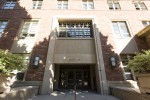The counseling office for the UCLA College of Letters and Science will hire two new advisers by the end of fall quarter in an attempt to reduce the waiting time for students seeking academic guidance.
Corey Hollis, director of academic advising in UCLA College Academic Counseling, said the student population has grown by about 30 percent over the last five years, but the number of advisors has not yet increased.
College Academic Counseling, which serves only students in the College of Letters and Science, is one of four main units at UCLA that provides students academic advice. Others include the Academic Advancement Program, Honors Programs and Academics and Student Services of UCLA Athletics. The 10 advisers in the College Academic Counseling office are responsible for assisting about 17,000 of 24,000 undergraduate students.
Hollis said the advisers have other responsibilities such as teaching university programs that reduce the amount of time they can spend helping students. She added long lines and wait times discourage students from seeing academic advisers.
“We’ve had particularly long lines recently and it’s a barrier to getting students to come in for advising,” she said. “Sometimes students come in and look at the lines and leave.”
Hollis said the counseling office has tried to accommodate more students in the past by making other changes.
When lines are long at the start of the quarter, the office, which usually has two advising stations, sends out a third adviser to help students. She added the office has also made permanent changes, such as creating an academic counseling office on the Hill.
Beginning this quarter, students can schedule an appointment at Murphy Hall and see a College Academic Mentor, or CAM, stationed in De Neve Plaza between 2 and 8 p.m., Hollis said. She added the office in De Neve Plaza is primarily for advising and does not handle more complicated issues like academic petitions.
“The satellite office expands our location and hours,” she said. “But the main barrier is space, because there isn’t much space on the Hill to house our CAMs.”
Chidi Enunwa, a third-year psychobiology student, said she had to wait days to get an appointment with a counselor she found unhelpful.
“He was not very knowledgeable about premedicine programs and told me to quit to do something easier,” she said. “I was discouraged and felt I had wasted my time.”
Hollis added the office plans to use various social media platforms to encourage students to seek academic counseling. The office will send out a survey within a few weeks to ask what platforms students want to use.
“We want students to know we’re around and to come see us, even if they think they know what they’re doing,” Hollis said.
